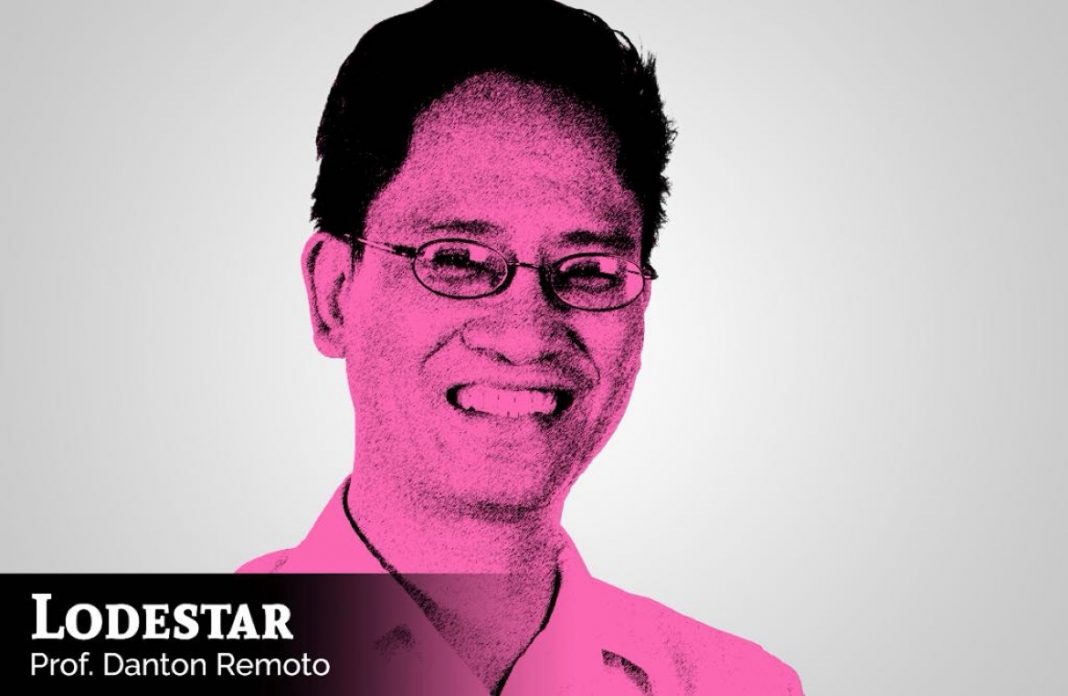By Professor Danton Remoto
A tempest in a teapot has been brewing among Filipino-American and Philippine-based academics on the use of Filipinx. Its anointment by a prestigious dictionary just added fuel to the fire.
I have lived in the US on and off for five years. When I first visited in 1989, Philippine-born writers and artists were just starting to make their presence felt, with the formidable Ninotchka Rosca kicking the door with the publication of her novel, “State of War.” I lived there again in the mid-1990s but felt a tectonic change when I studied at Rutgers University in 2000. The ones studying or teaching were already the Filipinos born in the USA.
This next generation knows their critical theories like the back of their hand. They are aware of the culture wars, of the need for political correctness, of ethnic-identity politics. But to a person they grew up estranged from the dominant white, male WASP that was dominant in the US. There has always been a need—an ache even—to assert themselves, to subvert the dominant ideologies in its many, insidious forms.
X, like Malcom X, denotes an entity that is unknown. It has been subverted by the Latinos into Latinx, a marvelous identity that is embraced and now known. Verily, the Fil-Ams also seems to have embraced the word Filipinx as well. They identify neither with the generic word Filipino; nor are they happy with the term “Filipina.” They also have their own, different lived experiences. Thus, the word “Filipinx” is now like a shield that they brandish against the world.
I have no major quarrel with this, as with other self-declared labels denoting one’s ethnic identity and politics, or one’s sexual orientation and gender identity. To each his or her own way of naming himself or herself. What goes against the grain, I guess, is what Philippine-based quarters note, the sheer arrogance and the blithe ignorance (?) of Philippine history and culture.
The Barcada Restaurant issue is one such example, where the Spanish word ‘Barquada’ [“from the same boat”] metamorphosed into the Filipino word “barkada,” and used to name a white-owned resto in Washington, DC. The only point I agreed with is that, as a sign of goodwill, the owners could have donated some profits to needy Filipinos back home. Why, the same charge could be said of the Fil-Ams advocating this label change. The Filipinos are in their direst circumstances since World War 2. Children need tablets or cell phones to study, the poor need rice, and what do they do? Scream hell over labels and ask the whites to donate. How about you, guys? Any single dollar coming to help the Philippines? Not all wars are fought in social media.
The UP linguist par excellence Tuting Hernandez has a mind finer than mine when it comes to language, and let us listen to him.
“The label is not meant to replace existing identities. It was coined as an alternative to Filipino/Filipina for those who do not identify with this binary. It also carries with it the histories, relations, and alliances of those who choose to own and identify with this label — histories that are unique and have long diverged from the histories of other Filipinos in the Philippines and in diaspora; relations that are their own, forged in communities that are different from ours; and alliances borne out of the political need for visibility in a struggle that might be far from our everyday life.
“The emergence of the lexicon caused some discomfort, misunderstandings, and raised eyebrows. These are common reactions when change occurs or when a new lexicon is introduced… Any imposition, linguistic or otherwise, always gets a strong push back. The inclusion of the term in the dictionary was also interpreted as an imposition. However, lexicographers are not word enforcers, they are collectors and compilers of lexicon. Most follow a basic rule that if a word sees print, then it must be included in the dictionary. The definition that appeared with Filipinx, however, needs some work.
“Proponents of the term should understand that Filipinx speaks of their experiences and realities and not those of other Filipinos, but we also have to acknowledge that the Filipinx experience is unique and valid and different from ours. If you identify as Filipinx, I support you. If you do not, then that is fine as well but there is no point in deriding each other because doing so is a victory to the colonizers and the patriarchy.
“The second point argues that there is no need for x because Philippine languages are gender neutral. The illustration/evidence that comes with this assertion is the Tagalog form of the third person singular pronoun, siya. We claim that because of the inclusiveness of siya, as opposed to the he/she binary of English, that our language is gender neutral. However, one linguistic feature does not make a language gender neutral…
“Languages borrow from each other without the intention of returning whatever was borrowed. It becomes part of the linguistic inventory of the borrower and becomes part of that language. It is of that language. Languages are not just products of genetics; they are also products of contact. If we say that these endings are non-Philippine, are we also denying the Philippine-ness of lexicon such as puti, baka, mukha, Lunes, Diyos and all other lexical items which have not descended from Proto-Philippines or from any of the intermediate nodes of the Philippine language tree?
“The expression of gender in our languages are not as overt as the gender classifiers in Spanish or French, instead the feature is coded more subtly. Even our linguistic performance is also governed by gender expectations — that is why we have expressions like “kababae mong tao…”. It helps to remember that language is a witness to the life of a society; it encodes its realities within. A sexist society will find ways to produce sexist language.”
It seems that, as in all things, Time will be the great arbiter of change. Let a particular group call themselves what they will, and we should respect that, for their name is shaped by their own matrix and milieu. But there should be no imposition, even arrogance on the part of the Fil-Ams, an attitude that, I’m sorry to say, I’ve found in some ivory towers of white universities in the USA.
*
Danton Remoto’s Riverrun, A Novel and The Heart of Summer: Stories and Tales have been published by Penguin Books Random House South East Asia. Copies are














